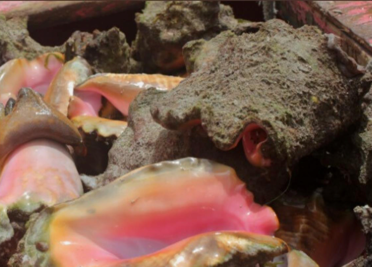June 9 2022 – Bridgetown, Barbados – The waters of the Caribbean are home to certain commercially exploited aquatic species, notably queen conch and sharks, which are included in Appendix II of the Convention on International Trade in Endangered Species of Wild Fauna and Flora (CITES). Queen conch fisheries contribute significantly to the livelihoods of communities in the region, and bring about economic opportunities through international trade in the region. The sustainable use, management and monitoring of these species, as well as the regulation of their trade is of paramount importance for their conservation.
To support Caribbean countries in meeting their commitments under the Convention, particularly with respect to CITES-listed species commercially exploited by the fisheries sector, the CITES Secretariat and the Food and Agriculture Organization of the United Nations (FAO)’s Development Law Service (LEGN)jointly organized a subregional training workshop from 30 May to 2 June 2022. The objective of the workshop was to train representatives of national fisheries administrations, CITES Management and Scientific Authorities and other relevant institutions and strengthening cooperation between fisheries and CITES authorities for the effective implementation of CITES in the fisheries sector.
About 80 participants from 12 Parties to CITES took part in the training, including Bahamas, Barbados, Belize, Dominica, Grenada, Guyana, Saint Kitts and Nevis, Saint Lucia, Saint Vincent and the Grenadines, Suriname, Trinidad and Tobago, and the United States of America. Representatives from the European Union, the Western Central Atlantic Fishery Commission (WECAFC) and the United Nations Conference on Trade and Development (UNCTAD) participated in the workshop as well.
Participants at the hybrid workshop were provided with an overview, basic training, and engaged in discussions on CITES key principles and requirements and their application in the fisheries sector; commercially exploited aquatic species listed in CITES Appendix II and relevant opportunities for collaboration between CITES and fisheries authorities, as well as overlapsbetween CITES and fisheries management. Additionally, how to use the FAO-CITES Legal Study and Guide, which contains legislative options for enhancing national fisheries legislation for better implementation of the Convention; the Agreement on Port States Measures (PSMA) and its relevance to CITES; and the differences and similarities between CITES legal acquisition findings (LAFs) and catch documentation scheme (CDS), based on the Technical Guidelines for Implementing and Understanding CDS were also part of the discussions.
Throughout the four days, each country shared their knowledgeand practical experience of CITES implementation, outlining the relevant institutional and regulatory framework, the importance of CITES-listed species, the challenges they face and current initiatives. The WECAFC also delivered a valuable presentation on the status of its members with respect to the implementation of the Regional Queen Conch Fisheries Management and Conservation Plan and gave a brief overview of the RegionalPlan of Action for the Conservation and Management of sharks, rays and chimaeras, to be endorsed by the Commission in July.
The workshop was successfully delivered with great assistance and support from colleagues at the FAO Subregional Office for the Caribbean, FAO Regional Office for Latin America and the Caribbean, and FAO Offices in the concerned countries. This was the second workshop delivered by FAO and the CITES Secretariat under the project on implementing CITES through national fisheries legal frameworks. The first workshop with Pacific Island Countries was held in November 2021.
Mauro Gongora, Fisheries Officer at Belize Fisheries Department, Romeo Lala, Chief Permit Section at Suriname Nature Conservation Division, and Laura Cimo, International Policy Advisor at the US National Marine Fisheries Service (NOAA) shared their reflections on the next steps: it was the intention of Belize and Suriname to create working groups that could enhance the cooperation between CITES authorities and fisheries authorities, particularly on the creation of non-detriment findings (NDFs) and LAFs for CITES-listed species,and the ongoing process within the countries regarding the development of a new CITES Act, which will allow for further implementation of the Convention and strengthening the related work. In the US, the sharing of information and strengthening of enforcement through higher penalties to deter illegal activities were also emphasized.
In her remarks during the closing of the Workshop, Rachel Gaughan, Legal Officer of the CITES Secretariat emphasized that “working together on CITES and fisheries matters can lead to more constructive results on cross-cutting issues, avoid working in silos and [rather] be mutually supportive”. Gaughan also encouraged the participation of States parties at the upcoming 19th Conference of the Parties of CITES, which will happen in Panama from 14-25 November 2022, noting the importance of their contributions to ongoing discussions onmatters such as LAF and introduction from the sea.
Blaise Kuemlangan, Chief of FAO LEGN, reiterated the areas oflinkages and convergence between CITES and fisheries, recognised the contribution of processes such as legal acquisition findings that could be explored for combatting illegal, unreported and unregulated fishing and recalled the challenges reported by each participating country which need to be addressed. In expressing his gratitude to the workshop participants, Kuemlangan reinforced FAO’s availability to support participating countries in further assistance they may need as a follow-up to the workshop.



